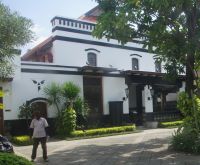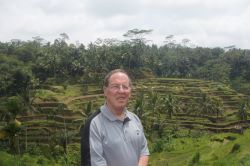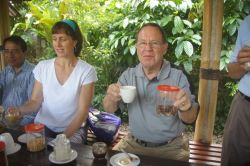Denpasar
I’m sitting in the Denpasar airport in Bali, awaiting the start of my 30-hour flight to the U.S., while pondering what has been one of the great mysteries of travel to me: time zones. How can we have moved closer to the United States from Surabaya, and yet the time gap has grown? It’s now 14 hours difference. Oh well, in 30 hours I’m not sure I’ll know where I am or what time it is anyway.

For the past 30 hours, however, what we’ve done has been perfectly understandable—history and culture. In Surabaya, we took the heritage tour, and believe me, there’s not much left from the Dutch days (that was 60-plus years ago!) We drove past the old police station, the Catholic cathedral, the first mosque, the first mall—and stopped in a few buildings. The city hall dates from the early ’20s, and has some nice art deco touches; the old Dutch club, which had a bowling alley, is now a tourist center. Ironically, it was the inner sanctum in the Dutch days, where the Dutch could retreat from the locals, who were denied entry (along with dogs).
Perhaps the best preserved building was what had once been a Dutch orphanage; bought in the early 1930s by a Chinese immigrant who had started a cigarette business when he arrived in Indonesia twenty years  earlier, the factory complex became the home of the kretek cigarette company, Sampoerna—a clove-flavored cigarette that caught on in Southeast Asia. A few years ago, the Sampoerna family (members changed their name from Liem to the Indonesian equivalent) sold the business to Philip Morris. The Sampoerna brand is still made in the factory complex, rolled by hand; the quickest worker (paid piecemeal) can roll 1,000 kreteks an hour! The family built houses and a theater, which were also part of the museum, which gave us a nice look at the lifestyles of the rich and famous.
earlier, the factory complex became the home of the kretek cigarette company, Sampoerna—a clove-flavored cigarette that caught on in Southeast Asia. A few years ago, the Sampoerna family (members changed their name from Liem to the Indonesian equivalent) sold the business to Philip Morris. The Sampoerna brand is still made in the factory complex, rolled by hand; the quickest worker (paid piecemeal) can roll 1,000 kreteks an hour! The family built houses and a theater, which were also part of the museum, which gave us a nice look at the lifestyles of the rich and famous.
Two hours of flight (because we crossed a time zone) brought us to the next island over, Bali, and we went (figuratively anyway) from a Muslim-dominant culture to a Hindu-dominated one; Bali’s 3.5 million inhabitants are over 85% Hindu. One of the participants noted it’s like being in 11th century India, since the Hindus are descendants of the Chola kingdom, who were gradually pushed out of Java and Sumatra by the Muslims. We got in late last night, and a few of us went to a nearby mall, which could have been set in Miami, so familiar were the brands (but the food was better; the Hindus do eat pork, so I had Nasi Goreng (fried rice) with pork—not widely available on Java.
I scheduled my trip back today (though the conference goes through tomorrow afternoon) partly because my connections today will get me home in 32 hours; if I left tomorrow, I would have had to spend 52 hours in the air or in the airports. Easy choice, though it left me wondering whether I’d have any time to sample Bali, other than the mall in Miami—er, Denpasar.
Fortunately, we had a full-day tour of the Hindu cities outside of Denpasar and Kuta (which do have world-class beaches for swimming or surfing!), and our local host arranged to have me picked up and whisked to the airport when the group broke for lunch.
 Hence, I was able to see the countryside, particularly the villages with the house, klan, and village temples (easy to love the Ganesha, the elephant-headed god), especially prominent today because there is a celebration of education, and many people were in traditional clothes; the terraced rice fields, reminiscent of China (three crops here, and the verdant agriculture exists because of a lot of rain); the caldera of an active volcano, which took us to almost 5,000 feet and tolerable humidity; and a break at an agricultural station for taste testing (and the factory outlet store) of local teas and coffees.
Hence, I was able to see the countryside, particularly the villages with the house, klan, and village temples (easy to love the Ganesha, the elephant-headed god), especially prominent today because there is a celebration of education, and many people were in traditional clothes; the terraced rice fields, reminiscent of China (three crops here, and the verdant agriculture exists because of a lot of rain); the caldera of an active volcano, which took us to almost 5,000 feet and tolerable humidity; and a break at an agricultural station for taste testing (and the factory outlet store) of local teas and coffees.
 One deserves special mention. We’d heard about Lowkat coffee before, but we got to see and taste it. It’s “filtered” through some kind of cat (not a meow one, but one that looks more like a lemming), who eats it, and excretes the bean. The bean is then washed and ground (becoming a has bean?), then made into a smooth, if expensive, coffee.
One deserves special mention. We’d heard about Lowkat coffee before, but we got to see and taste it. It’s “filtered” through some kind of cat (not a meow one, but one that looks more like a lemming), who eats it, and excretes the bean. The bean is then washed and ground (becoming a has bean?), then made into a smooth, if expensive, coffee.
A pundit in our group said something you might have expected from me: “the guy who discovered this was a real entrepre manure!”
That’s enough puns before a long flight, and a return to the U.S. To all my new best friends from this FDIB trip, I wish you a pleasant journey, and hope we can travel together again. Namaste!